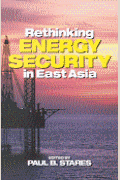


Book
Since the beginning of the 1990s, the security implications of East Asia’s growing demand for energy have become the focus of increasing attention and debate. To some, the prospect that East Asian countries will increasingly rely on foreign energy imports, especially from the Middle East, compete and possibly clash in the exploitation of new reserves, and expand significantly their civil nuclear power infrastructure raises a host of disquieting security concerns. Some worry that such concerns will become a potent source of regional instability and even conflict unless preventive steps are taken now to ameliorate them.
Others, however, are more sanguine about such energy-related insecurities in the belief that the global energy market and the international economy in general are changing in fundamental ways to lessen their impact on regional peace and security. Indeed, it is argued that the imperatives generated by East Asia’s energy predicament will drive the search for cooperative solutions. Meanwhile, other analysts worry more about the potential ecological risks associated with rising energy use and consider these to be by far the most pressing challenges to the well-being or “human security” of those living in the region.
In this book, leading experts from seven countries–Japan, Russia, China, the United States, South Korea, Taiwan, and Malaysia–assess these contrasting energy security issues for their likely impact. As such, this book represents the first in-depth study on the topic from primarily an Asian perspective. Moreover, by examining both the “classical” energy security questions of supply and demand as well as the ecological and human security consequences of growing energy use in East Asia, the book provides the first truly comprehensive assessment of the key issues.
Related Books

Carlos Pascual, Jonathan Elkind
December 29, 2009

William R. Lowry
December 12, 2011

José Manuel Salazar-Xirinachs, Maryse Robert
March 1, 2001
Author